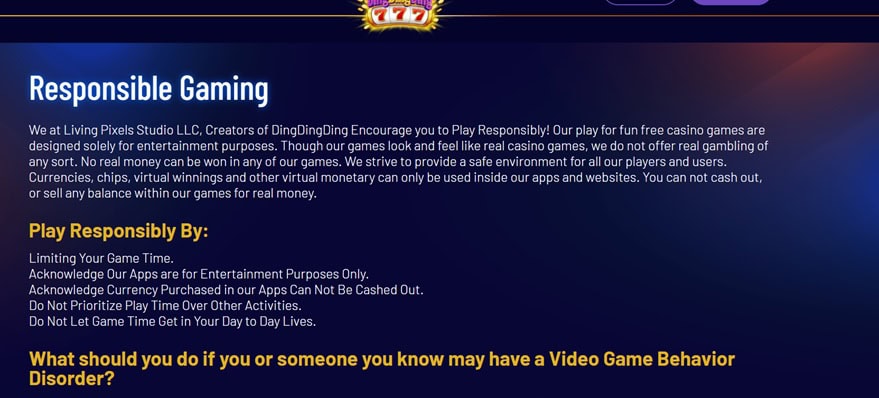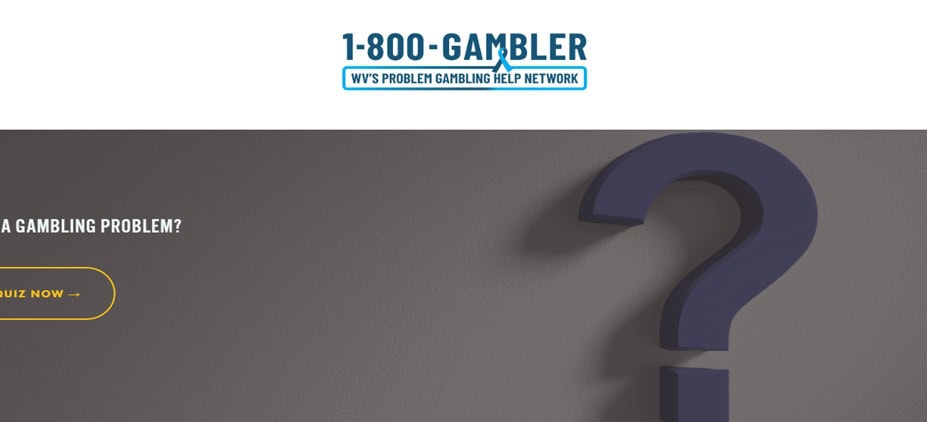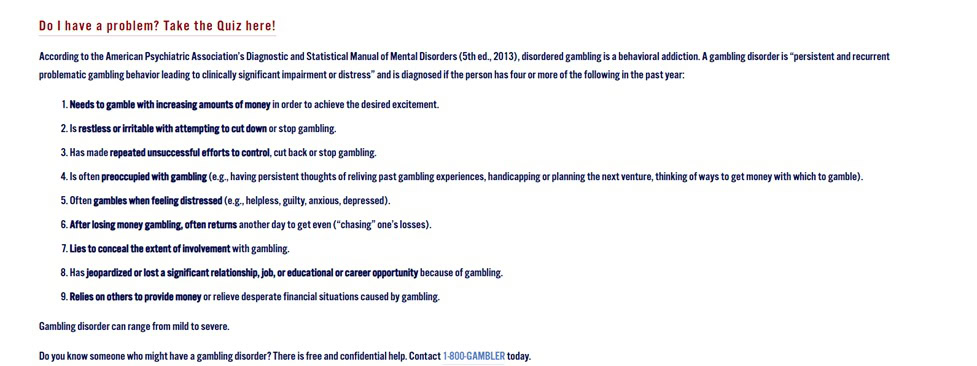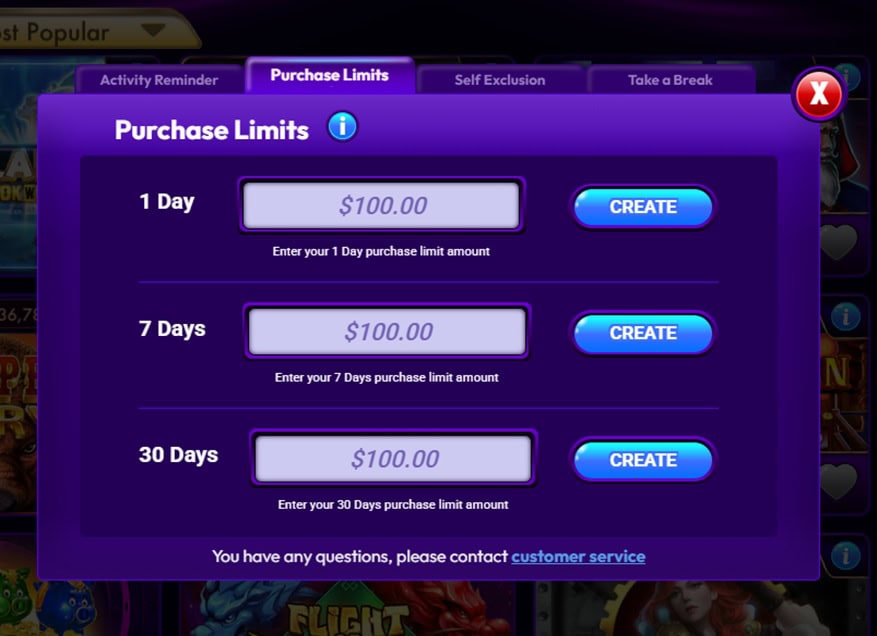Social casino gaming is an exciting addition for US casino enthusiasts who want a fun time at no cost. These sites allow you to play real casino games for free, and the sweepstakes casino options will also let you redeem cash prizes.
Responsible Social Gameplay (RSG) & Problem Gaming
With the potential to win real prizes without spending money, there is a possibility of developing problem gaming habits when playing at these sites. To prevent this from happening, we at SweepsKings have decided to inform our readers of the importance of responsible social gaming.
As you read, you’ll learn how to play safely, protect your loved ones, use responsible gaming tools at the casinos we promote, and where to get professional help.
What is Responsible Social Gameplay?
Responsible social gameplay is a set of rules or principles that guide your gaming activities in order to prevent the development of undesirable gaming habits. Also known as Responsible social gaming practices (RSGP), the aim is to promote casino gaming for entertainment purposes, shifting the focus from just the profit element to the fun of placing bets on your favorite social casino games.
Responsible social gameplay is actually a shared responsibility among the player, operator, and third-party stakeholders. Everyone has a part to play in creating a safe and healthy gaming environment. Recently, the Social and Promotional Gaming Association (SPGA) was launched as a new trade group for promoting a responsible social gaming environment among other things. And companies like Blazesoft and High 5 Entertainment are already on board. The moral is that responsible gaming is becoming more vital than ever.
That said, our focus in this guide is on how to do your part as a player. This includes spending a controlled amount of time on the site, playing within a budget, and spending only your dedicated “play” funds whenever it becomes necessary to buy coins.
Responsible gaming and responsible gambling are pretty much the same thing applicable in different contexts. Throughout this guide, we use them interchangeably to highlight the dangers of gambling addiction across all settings (real money casinos, social casinos, sweepstakes).
What is Problem Gambling?
Problem gambling is a situation in which an individual has no control over how they act when it comes to their gambling activities. All undesirable gaming habits fall under problem gambling.
These include spending more money than you can afford to lose, playing for an excess amount of time, and usually neglecting family, friends, school, and work to enjoy the adrenaline rush that comes with online gaming.
Signs of Problem Gaming
Everyone reacts differently to the same issue, leading to multiple signs of problem gambling. As a sweepstakes casino player, you must always be on the lookout for any of these signs and get help the moment you identify them:
- Compulsive need to risk valuable items that you cannot afford to lose in hopes of a better reward.
- Making gaming your primary source of income.
- Hiding your gambling activities from friends and loved ones.
- Strong emotional attachment (anger, stress, frustration, misery) to your losses on social casinos.
- Neglecting important real-life chores to play.
- Inability to stick to a budget.
- Constantly thinking about logging into your social casino account.
While some problem gamblers may get over their problem with time, others fall into an addiction known as ‘compulsive gambling.’ Detecting signs of problem gambling early on and taking necessary steps helps to prevent falling into the addictive gambling disorder.
Impact of Problem Social Gaming
Suppose the signs we’ve mentioned above appear and no action is taken to control the situation. In that case, these are some of the potential consequences:
- Severe financial losses that can spiral to bankruptcy due to overdue bills, borrowing, maxed-out credit cards.
- Possibility of job loss due to poor work performance and gambling on the job.
- Issues in interpersonal relationships (neglecting friends and family).
- Divorce, loss of access to kids, and other legal issues.
- Committing to criminal acts in order to fund compulsive gaming habits.
- Depression and other mental health issues.
- Self-harm or suicidal thoughts, in the most extreme cases.
As you can see above, the negative impact of gaming addiction extends beyond potential financial ruin. It can also harm your physical and mental health, workplace productivity, and interhuman relationships.
Prevention: Responsible Social Gaming Tips & Guidelines
To ensure that you play responsibly, here are some excellent tips that you must remember at all times:
1. Always assume you will lose any money you spend on the sweepstakes casino. This way, you have minimal expectations and are less likely to chase losses.
2. Only play with your entertainment funds. Don’t use money for your daily expenses, and don’t borrow money to play social casino games.
3. If you don’t find any responsible gaming tool or promotions on a casino, don’t play on the site. Responsible gaming is one of the assessment criteria for our reviews here at SweepsKings and is an indicator of a legal sweepstakes site.
4. Learn the signs of problem gaming and constantly assess yourself. If you notice you’re spending excess time playing games, trying to win back losses, or starting to see gaming as a source of income, then it’s time to take a break.
5. Don’t let gaming replace other hobbies. The key is to play in moderation without giving up other activities you enjoy.
6. Avoid visiting sweepstakes casinos when you’re mentally, physically, or emotionally down. Seek professional help for these issues, and don’t try to play games to ease your pain.
7. Always have a budget and time limit, but sticking to these limits is more important.
8. If you play with others, only roll with individuals who showcase excellent responsible gaming habits.
9. Just like driving, alcohol and social gaming don’t mix. If you’re playing casino-style games under the influence, you won’t be able to enforce your responsible gaming rules.
10. Avoid canceling your Sweeps Coin redemptions, as that usually leads to spending outside your initial budget.
Responsible Gaming Tools at Online Sweepstakes Casinos
The role of sweepstakes casino operators involves providing responsible gaming tools that you can activate on your account. You should find the relevant settings in the account section.
Otherwise, you have to reach out to customer support to activate these tools.
The first option is more desirable because you can enforce it instantly when the need arises. Our guide to casinos with the best responsible gameplay tools points you towards the top operators in that regard.
Purchase Limits
This restricts the maximum amount you can spend on Gold Coin packages. WOW Vegas, Mega Bonanza, and McLuck Casino are some sites with this excellent feature.
Reality Check/Activity Reminder
This feature allows you to set an alarm that reminds you how long you’ve been online. You can find this feature on Chumba and High 5 Casino, with the option to set 1, 2, or 3-hour alerts.
Play/Bet Limit
This limit allows you to set the maximum amount of Sweeps Coins you can spend over a specific period. So, if you set a 100 SC weekly limit, your SC play is restricted once you spend 100 SC. Only a few casinos offer this limit, but you can find it at Chumba Casino.
Daily Time Limit
This limits the maximum time you can spend logged into your account daily. Note that whether for purchase, play or daily limits, a request to decrease your limit will be processed instantly. In contrast, a request for an increase usually has a pending or cooldown period of 7 days. This is to prevent you from spending on impulse.
Time Out/Take a Break
This feature temporarily locks your account. RealPrize.com, for instance, allows you to block your account for 1, 3, 7, 14, or 30 days.
Account History
This is a tracking tool to help you stay on top of your transactions at the casino. There’s usually a purchase history and a redemption history.
Geolocation & KYC Checks
Although these two points don’t fall directly under the responsible gaming tools at sweepstakes casinos, we here at SweepsKings still consider them crucial.
Firstly, online casinos should ensure through advanced geolocation technology that non-eligible players aren’t able to view or register at the site. Players shouldn’t be presented with any games or bonuses before ensuring they are eligible.
On the second point, we appreciate online sweepstakes casinos that have voluntarily raised the minimum age limit from 18 to 21 (Chumba, Stake.us, High 5). Though this measure is pointless unless the online casinos enforce KYC checks before enabling purchases and redemptions.
Stake.us forces everyone to verify their ID before playing, but most other platforms still delay KYC verification until the user attempts to cash out.
Self-Exclusion on Social Casinos
Unlike the time-out feature, which usually lasts for a much shorter duration, self-exclusion blocks your account for an extended period, usually up to 5 years. On the social casinos we promote, we verify that they all offer the option for players to exclude themselves from their service for a period. Although self-exclusion is a more drastic measure for curbing problem gaming, it’s the best option if you feel you’re becoming a compulsive player.
Bear in mind that self-exclusion halts pending payouts and prevents processing new prize redemptions. Self-exclusion also affects related or sister sites. So if you self-exclude from Chumba Casino, for instance, you’ll also be locked out from other VGW sites, like LuckyLand Slots and Global Poker, until the self-exclusion time lapses.
WOW Vegas has a cool feature allowing players who haven’t yet registered to self-exclude, acting as a preemptive measure.
Account closure is a last resort solution offered at sweepstakes casinos, and it’s irreversible. When you shut down your account, you can’t reopen it ever again. So, I suggest you only request account closure if you don’t wish to visit that casino again in the future.
This option is usually not available under the ‘access restrictions’ tab on your account menu. So to close your account, you must contact customer support directly. If you’ve permanently closed your account by mistake, you can look for new sweepstakes casinos to join.
Helping Loved Ones Struggling with their Gaming
If you find out that someone close to you is struggling with problem gaming, you can help them get over this addiction. However, when you try to help, don’t try to control their life or be judgmental.
At SweepsKings, some of the actions we recommend to help out your loved ones include:
When dealing with kids, there are some unique problem gaming signs you need to look out for. They include:
- An increase in time spent on online games (some console games have a bit of gambling involved nowadays).
- More interest in gambling-related shows (WSOP, European Poker Tour).
- Frequent borrowing of money from family or friends without any meaningful purchase.
- A sudden increase in spending money (indicating a cash-out).
- Frequent mood swings (especially after sporting events) and drop in grades.
- Interest in influencers/streamers playing casino games.
There is a limit to how much a sweepstakes casino can do to prevent underage gaming. In most cases, the only effective tool is the age verification process, and many casinos only enforce this process during redemptions. Therefore, it’s your duty as a parent/guardian to protect your children from social or real money casino sites.
Everyone will have a unique approach when it comes to preventing underage gambling, but here are some of the best ways to help:
- Don’t visit social casinos in the presence of your kids so they don’t subconsciously gain interest.
- Don’t use the “remember me” option when logging in to your casino accounts.
- Have clear rules to limit internet use in the home.
- If the kids need to make online payments using your credit card, ensure you know what they are paying for.
- Find the right way to talk to them about gambling.
- Learn the signs of addiction and look out for them.
Resources for Professional Help - Support Groups and Gambling Helplines
In addition to our tips on responsible gameplay and dealing with gambling addiction, you can also get help from professional support groups if you’re unable to maintain control.
One of the recognized professional groups for problem gambling support in the US is the National Council on Problem Gambling. It’s a nonprofit organization offering services in all parts of the US. You can reach out to them through these channels:
- Call: 1-800-GAMBLER
- Text: 800GAM
- Chat: 1800gamblerchat.org
For assistance closer to home, here’s the directory of local problem gambling organizations and gambling hotlines by state:
| State | Local State Resources | Problem Gambling Hotline |
|---|---|---|
| Alabama | Alabama Council on Compulsive Gambling | 334-277-5100 |
| Alaska | - | 1-800-GAMBLER |
| Arizona | Arizona Council on Compulsive Gambling | 1-800-NEXTSTEP 480-221-2092 800-777-7207 |
| Arkansas | Arkansas Problem Gambling Council | 501-403-2321 |
| California | California Council on Problem Gambling | 714-765-5804 |
| Colorado | Problem Gambling Coalition of Colorado | 303-662-0772 |
| Connecticut | Connecticut Council on Problem Gambling | 888-789-7777 959-230-4034 |
| Delaware | Delaware Council on Gambling Problems | 888-850-8888 302-655-3261 |
| Florida | Florida Council on Compulsive Gambling | 888-ADMIT-IT 888-236-4848 |
| Georgia | - | 1-800-GAMBLER |
| Hawaii | - | 1-800-GAMBLER |
| Idaho | - | 1-800-GAMBLER |
| Illinois | - | 833-937-4274 |
| Indiana | Indiana Council on Problem Gambling | 800-994-8448 317-632-1364 |
| Iowa | - | 1-800-GAMBLER |
| Kansas | Kansas Coalition on Problem Gambling | 785-266-8666 |
| Kentucky | Kentucky Council on Problem Gambling | 502-223-1823 |
| Louisiana | Louisiana Association on Compulsive Gambling | 1-877-770-STOP 318-227-0883 |
| Maine | Maine Council on Problem Gambling, Inc. | 207-520-0293 |
| Maryland | Maryland Council on Problem Gambling Maryland Center of Excellence on Problem Gambling | 443-292-2809 667-214-2120 |
| Massachusetts | Massachusetts Council on Gaming and Health | 1-800-327-5050 617-426-4554 |
| Michigan | Michigan Association on Problem Gambling | 800-270-7117 517-672-6904 |
| Minnesota | Minnesota Alliance on Problem Gambling | 1-800-333-HOPE 612-424-8595 |
| Mississippi | Mississippi Council on Problem and Compulsive Gambling | 1-888-777-9696 601-853-8351 |
| Missouri | - | 1-800-GAMBLER |
| Montana | Montana Council on Problem Gambling | 888-900-9979 406-438-1276 |
| Nebraska | Nebraska Council on Problem Gambling | 1-833-BETOVER 402-890-0504 |
| Nevada | Nevada Council on Problem Gambling | 702-369-9740 |
| New Hampshire | - | 603-724-1605 |
| New Jersey | Council on Compulsive Gambling of New Jersey | 609-588-5515 |
| New Mexico | New Mexico Council on Problem Gambling Responsible Gaming Association of New Mexico | 1-888-696-2440 505-897-1000 |
| New York | New York Council on Problem Gambling | 1-877-8-HOPENY 518-867-4084 |
| North Carolina | North Carolina Council on Problem Gambling | 336-370-6952 |
| North Dakota | - | 1-800-GAMBLER |
| Ohio | The Problem Gambling Network of Ohio Ohio Problem Gambling Online Resource Directory Ohio for Responsible Gambling | 1-800-589-9966 614-750-9899 |
| Oklahoma | Oklahoma Association on Problem Gambling and Gaming | 405-801-3329 |
| Oregon | Oregon Council on Problem Gambling | 1-877-MY-LIMIT 971-361-9333 |
| Pennsylvania | Council on Compulsive Gambling of Pennsylvania, Inc. | 215-643-4542 |
| Rhode Island | Rhode Island Council on Problem Gambling | 401-499-2472 401-354-2877 |
| South Carolina | - | 1-800-GAMBLER |
| South Dakota | - | 1-800-GAMBLER |
| Tennessee | - | 1-800-GAMBLER |
| Texas | - | 1-800-GAMBLER |
| Utah | - | 1-800-GAMBLER |
| Vermont | - | 1-800-GAMBLER |
| Virginia | Virginia Council on Problem Gambling | 1-888-532-3500 804-827-0921 |
| Washington | Evergreen Council on Problem Gambling | 1-800-547-6133 360-352-6133 |
| West Virginia | - | 1-800-GAMBLER |
| Wisconsin | Wisconsin Council on Problem Gambling | 1-800-GAMBLE-5 920-437-8888 |
| Wyoming | Wyoming Council on Problem Gambling | 307-620-2655 |
If you reside in a state without a local problem gambling help organization, you can also reach out to self-help organizations like Gam Talk, Gam-Anon, and Gamblers Anonymous.
Final Thoughts & Recommendations
Now you know all there is to know about responsible gaming, including the signs, symptoms and impact of problem gambling. Responsible gaming is fundamental for anyone who enjoys playing at sweepstakes casinos, and advocacy groups like the American Gaming Association are calling for more focus to be placed on responsible gaming within the sweepstakes ecosystem.
The best casinos are already doing their part to promote a safe gaming environment. It’s left to you to assess yourself or your loved ones and use the tools and resources at your disposal to ensure neither you nor they fall into the trap of problem gambling.
What SweepsKings would like to see in the future is a body like the SPGA establishing a national Self-Exclusion Register, helping players abstain proactively from all sweepstakes casinos. GAMSTOP in the UK and BetStop in Australia play the same role, but we haven’t yet seen such a measure taken in the US.
For further direction or help, don’t hesitate to contact SweepsKings and we’ll ensure you get in touch with a professional.




